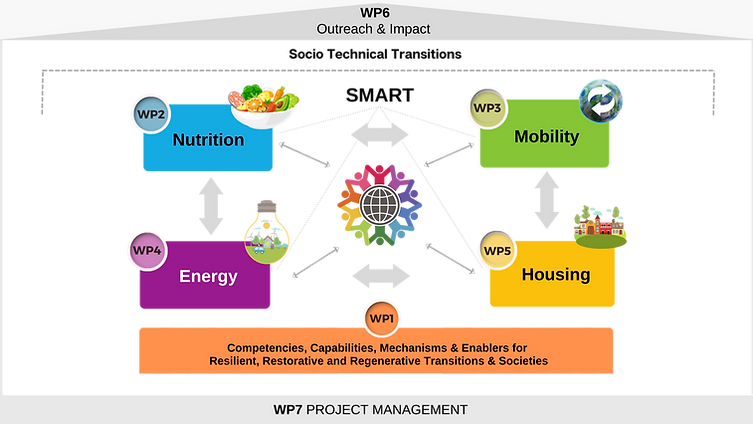Structure of the SMAR3TS project

WP1 - Competencies, Capabilities, Mechanisms & Enablers for R3 Transitions & Societies
WP2 in the short-term will inform practice and policy with fresh insights. Long-term efforts focus on shaping climate-positive futures through scenario planning. Key goals include building green skills, strengthening systems to support Resilience, Restoration, and Regeneration (R3) creating frameworks that drive lasting change. The R3 Framework will be contextualised and piloted across WP's 2-5.
WPs 2-5 - Nutrition, Mobility, Energy, Housing
Work Packages 2–5 will explore how we can shift towards more resilient, restorative, and regenerative systems in key areas like nutrition, mobility, energy, and housing. This includes background research, collaboration across disciplines and sectors, and future-focused thinking to shape what these transitions could look like. We'll also use an action-based research approach to help move ideas forward—whether they're tech-driven or focused on social change.
_edited.png)
WP2 - Nutrition
Food systems are fundamental to societies and economies yet simultaneously play a significant role in the depletion of biodiversity, and exacerbation of climate change. Extreme weather disrupts food production, storage, and transport, making health diets harder to access and afford. At the same time, current food practices are damaging the environment, accelerating climate change, deforestation, and biodiversity loss. Growing global food shortages are making the existing crises worse as well as raising the risk of conflict. WP 2 will focus on reshaping food systems to meet the challenges of climate change and rising global demands.
_edited.png)
WP3 - Mobility
Transport accounts for 25% of global CO₂ emissions and is a major source of air pollution. While technology is advancing quickly, it alone won’t solve the problem. We also need policy-driven behavioural shifts, system-wide innovation, and smarter urban planning—like the 15-minute city model, where daily needs are met locally. WP3 will tackling challenges around cutting transport emissions and breaking down tech and consumer barriers and will look ahead - using tools like strategic foresight and roadmapping to shape the future of mobility.
_edited.png)
WP4 - Energy
Global energy demand is expected to rise by 30% by 2040. To meet this challenge, we need energy systems that are clean, secure, affordable, and sustainable. This work package supports a just transition to green energy by promoting innovation, policy change, and workforce development. WP4 will contribute to building energy systems that can withstand climate impacts, disasters, and geopolitical shifts.
_edited.png)
WP5 - Housing
Buildings are responsible for around 30% of global energy emissions, driven by construction, heating, cooling, lighting, and appliances. Achieving net-zero buildings is a major challenge—but also a chance to accelerate clean energy adoption and shift behaviours. WP5 will help to shape immediate improvements around stronger structures, tech, and smarter incentives for sustainable choices. By sharing knowledge and raising awareness on saving money, cutting emissions, and making climate-conscious decisions, we unlock new thinking and drive real change.
WP6 - Outreach & Impact
This work package boosts the visibility and impact of research by sharing findings and innovations widely. Its strategy helps advance knowledge, shape policy, guide industry, and promote innovation—driving economic growth and tech adoption. Communication, dissemination, and exploitation also strengthens researcher profiles, supports funding opportunities, and encourages collaboration. Through inclusive outreach, it fosters knowledge exchange, skill-building, and diverse career pathways.